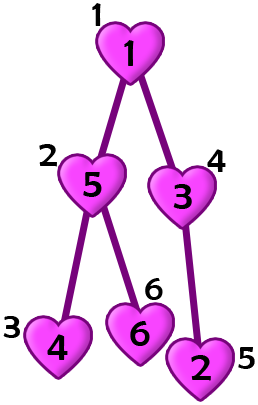CF1740E.Hanging Hearts
普及/提高-
通过率:0%
AC君温馨提醒
该题目为【codeforces】题库的题目,您提交的代码将被提交至codeforces进行远程评测,并由ACGO抓取测评结果后进行展示。由于远程测评的测评机由其他平台提供,我们无法保证该服务的稳定性,若提交后无反应,请等待一段时间后再进行重试。
题目描述
Pak Chanek has n blank heart-shaped cards. Card 1 is attached directly to the wall while each of the other cards is hanging onto exactly one other card by a piece of string. Specifically, card i ( i>1 ) is hanging onto card pi ( pi<i ).
In the very beginning, Pak Chanek must write one integer number on each card. He does this by choosing any permutation a of [1,2,…,n] . Then, the number written on card i is ai .
After that, Pak Chanek must do the following operation n times while maintaining a sequence s (which is initially empty):
- Choose a card x such that no other cards are hanging onto it.
- Append the number written on card x to the end of s .
- If x=1 and the number on card px is larger than the number on card x , replace the number on card px with the number on card x .
- Remove card x .
After that, Pak Chanek will have a sequence s with n elements. What is the maximum length of the longest non-decreasing subsequence † of s at the end if Pak Chanek does all the steps optimally?
† A sequence b is a subsequence of a sequence c if b can be obtained from c by deletion of several (possibly, zero or all) elements. For example, [3,1] is a subsequence of [3,2,1] , [4,3,1] and [3,1] , but not [1,3,3,7] and [3,10,4] .
输入格式
The first line contains a single integer n ( 2≤n≤105 ) — the number of heart-shaped cards.
The second line contains n−1 integers p2,p3,…,pn ( 1≤pi<i ) describing which card that each card hangs onto.
输出格式
Print a single integer — the maximum length of the longest non-decreasing subsequence of s at the end if Pak Chanek does all the steps optimally.
输入输出样例
输入#1
6 1 2 1 4 2
输出#1
4
输入#2
2 1
输出#2
2
说明/提示
The following is the structure of the cards in the first example.

Pak Chanek can choose the permutation a=[1,5,4,3,2,6] .

Let wi be the number written on card i . Initially, wi=ai . Pak Chanek can do the following operations in order:
- Select card 5 . Append w5=2 to the end of s . As w4>w5 , the value of w4 becomes 2 . Remove card 5 . After this operation, s=[2] .
- Select card 6 . Append w6=6 to the end of s . As w2≤w6 , the value of w2 is left unchanged. Remove card 6 . After this operation, s=[2,6] .
- Select card 4 . Append w4=2 to the end of s . As w1≤w4 , the value of w1 is left unchanged. Remove card 4 . After this operation, s=[2,6,2] .
- Select card 3 . Append w3=4 to the end of s . As w2>w3 , the value of w2 becomes 4 . Remove card 3 . After this operation, s=[2,6,2,4] .
- Select card 2 . Append w2=4 to the end of s . As w1≤w2 , the value of w1 is left unchanged. Remove card 2 . After this operation, s=[2,6,2,4,4] .
- Select card 1 . Append w1=1 to the end of s . Remove card 1 . After this operation, s=[2,6,2,4,4,1] .
One of the longest non-decreasing subsequences of s=[2,6,2,4,4,1] is [2,2,4,4] . Thus, the length of the longest non-decreasing subsequence of s is 4 . It can be proven that this is indeed the maximum possible length.